The Velazquez Lab is seeking applications for the competitive Edson postdoctoral fellow
We invite applications for an Edson Foundation Postdoctoral Research Scholar in the ASU Neurodegenerative
Disease Research Center (NDRC) at Arizona State University’s. The NDRC is a center in the world renown Biodesign
Institute and the fellowship would be in the laboratory of Dr. Ramon Velazquez. Under the direction of founding
director Dr. Jeffrey Kordower, the goal of the Edson Foundation and NDRC is to fund research and scholars that
will aid in new discoveries and solutions to better the quality of life for people affected by neurodegenerative
diseases such as Alzheimer’s and Parkinson’s disease.
The selected candidate will work in the Velazquez laboratory, which is focused on identifying early molecular
events that are triggered by environmental factors that accelerate disease. This lab is also interested in drug
discovery and dietary supplementation of B-like vitamins as a method to prevent disease progression.
Additionally, the lab has a strong focus on understanding why individuals with Down Syndrome (a genetic disorder
resulting in intellectual disabilities) show an increase prevalence of Alzheimer's disease. The Velazquez lab
uses a variety of model systems, including invitro cell models of disease, transgenic rodent models, and both
nonhuman primate and human tissue from patients.
We will begin reviewing applications May 15th, 2023 and will continue to review incoming applications on a
biweekly basis until the position is filled.
Click to visit the
application page
Velazquez Lab of Neurodegenerative Diseases

Given that the elderly is the fastest growing population in our society and that age is the single most important risk factor for Alzheimer’s disease (AD), there is an urgent need to understand the mechanisms contributing to AD pathology. Doing so, we will be able to develop strategies by which we can prevent the incidence of AD, as well as help those that are currently in advanced stages of this disease. One of the most fruitful approaches for studying neurodegenerative diseases stems from utilizing a multidisciplinary strategy. Dr. Velazquez graduate and early postdoctoral studies have shaped him into a well-rounded neuroscientist with this type of multidisciplinary approach, as he received extensive training in behavioral neuroscience, animal models of disease, neurobiology and molecular neuroscience. This allows the VLoND team to ask questions at multiple levels of analysis. The VLoND ultimate goal is to progress science while consecutively helping those who suffer from Neurodegenerative diseases.
Recent News
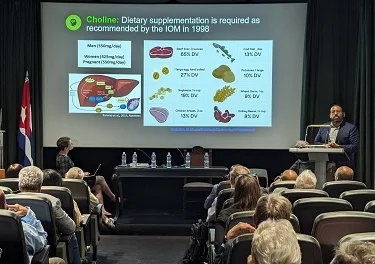
Dr. Ramon Velazquez from ASU participates in the "AAAS and Cuban Academy of Sciences Brainstorm on U.S.-Cuba Shared Challenges and Opportunities in Aging and Disaster Management"
April 18, 2024
A U.S.-based delegation led by AAAS traveled to Havana to discuss potential areas of collaboration with Cuban scientists at a
professional meeting on aging and disaster management from March 19-20.
Attendees from the U.S. and Cuba learned about national and local efforts
in both countries to address natural and man-made disasters, scientific research on aging in the U.S. and the Caribbean, and the scientific publishing process,
among other topics.
Click
to read the full article
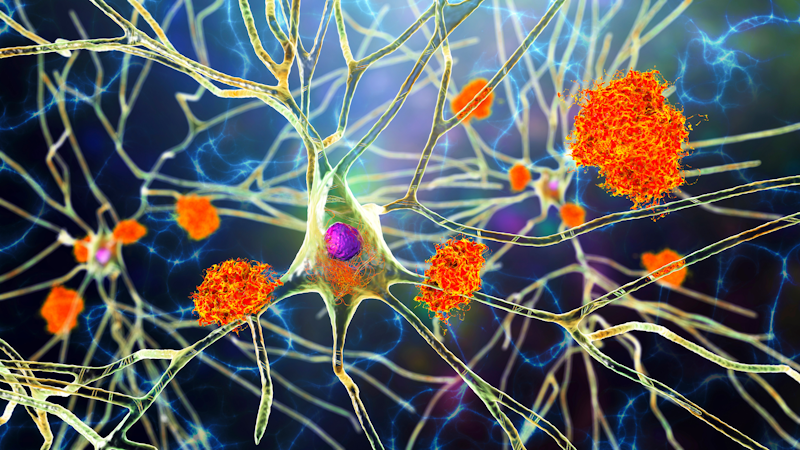
New research links low choline levels in blood to Alzheimer's disease progression
August 7, 2023
In a new study, senior author Ramon
Velazquez, first author and ASU Edson Postdoctoral
Fellow Jessica Juddand, and their colleagues at the ASU
School of Molecular Sciences and the Banner Brain and
Body Donation Center present evidence that low levels of choline in the bloodstream are associated with
increased severity of Alzheimer's disease pathology in the brain.
Click
to read the full article
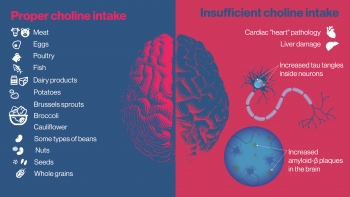
Study Explores Effects of Dietary Choline Deficiency on Neurologic, System-Wide Health
January 17, 2023
Choline, an essential nutrient produced in small amounts in the liver and found in
foods including eggs, broccoli, beans, meat and poultry, is a vital ingredient for human health. A new
study explores how deficiency in dietary choline adversely affects the body and may be a missing piece in
the puzzle of Alzheimer’s disease.
Click
to read the full article

An Interview with Dr. Ramon Velazquez on Glyphosate Exposure and the Importance of Daily Dietary Choline Supplementation
September 29, 2022
Did you know that the herbicide glyphosate can cross the blood-brain barrier,
resulting in an increase of neuro-inflammation? Join Food Sleuth Radio host and Registered Dietitian,
Melinda Hemmelgarn, for her interview with Ramon Velazquez, Ph.D., Assistant Professor in the School of
Life Sciences, and Neurodegenerative Disease Research Center at the Biodesign Institute, Arizona State
University.
Click to listen to the interview and
read more

Pesticide research links chemical compound to brain disorders
September 6, 2022
Researchers have discovered a chemical compound called glyphosate, found in common
herbicides, that infiltrates the layers of cells that protect the brain. The research shows that this
chemical can elevate levels of molecules associated with disorders such as Alzheimer’s disease in
humans.
Ramon Velasquez of Biodesign Neurodegenerative Disease Research Center and Patrick Pirrotte
from Translational Genomics Research Institute (TGen) discuss their findings.
Click to watch
the video and read the full article

New study says glyphosate may be linked to neurodegenerative diseases
August 19, 2022
Glyphosate, the world’s most widely used weed killer, can reach the brain and cause
inflammation associated with neurodegenerative diseases such as Alzheimer’s and Parkinson’s disease,
according to new research. These findings add to growing concerns that glyphosate and other pesticides are
leaving a damaging impact on human health and the environment.
The results mark the first time
scientists have identified glyphosate present in brain tissue, said Ramon Velazquez, an assistant
professor studying neurodegenerative diseases at Arizona State University and a senior author of the
study
Click
to read the full article
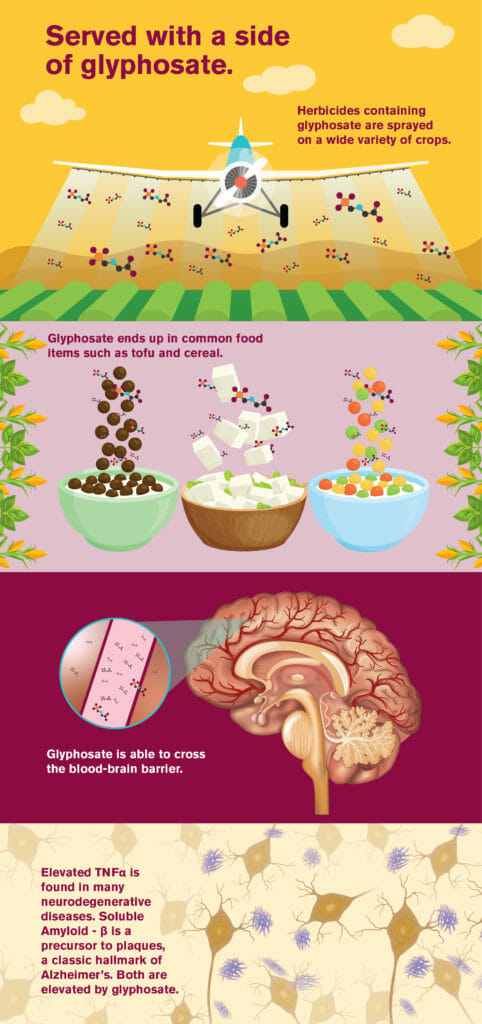
New study shows that a commonly used agricultural herbicide crosses into the brain and may increase risk of neurodegenerative disorders
July 27, 2022
Neurodegenerative illnesses, such as Alzheimer’s disease, are among the most
perplexing in medical science. The underlying causes of such diseases range from genetic factors and
overall cardiovascular health to dietary influences and lifestyle choices.
Various environmental
contaminants have also been implicated as possible players in the development or advancement of
neurodegenerative disease. Among these is a broad-spectrum herbicide, known as glyphosate. Glyphosate is
commonly used herbicide, applied to agricultural crops around the world.
In a new study, first
author Joanna Winstone, senior author Ramon Velazquez, and their colleagues at the Translational Genomics
Research Institute (TGen) explore the effects of glyphosate exposure on the brains of mice. The research
demonstrates, for the first time, that glyphosate successfully crosses the blood-brain barrier and
infiltrates the brain. Once there, it acts to enhance levels of a critical factor known as TNF-α, (for
tumor necrosis factor alpha).
Click
to read the full article

Untangling the brain: New research offers hope for fighting Alzheimer’s disease
May 12, 2021
Since the discovery of Alzheimer’s disease over a century ago, two hallmarks of the
devastating illness have taken center stage. The first, known as amyloid plaques, are dense accumulations
of misfolded amyloid protein, occurring in the spaces between nerve cells. Most efforts to halt the
advance of Alzheimer’s disease have targeted amyloid protein plaques. To date, all have met dispiriting
failure.
Click
to read the full article

Edson seed grants advance innovative dementia solutions
September 24, 2020
More than $300,000 from the Charlene and J. Orin Edson Initiative for Dementia Care
and Solutions was awarded to three Arizona State University research teams for innovative research
projects. The funding comes from a portion of Charlene and J. Orin Edson’s $50 million gift to ASU for
dementia research and education initiatives.
Click
to read the full article

ASU researchers looking at common supplement to battle Alzheimer’s
October 8, 2019
Arizona State University researchers are looking at the nutrient choline as a way to
prevent Alzheimer’s disease. Research with mice shows that choline helps reduce the activation of
microglia, specialized cells that rid the brain of debris. When over activated, microglia can lead to
neuronal death and brain inflammation. Choline also blocks production of amyloid-beta plaques, caused by
the protein fragment beta-amyloid, which can lead to nerve cell death. Ramon Velazquez, a lead author of
the new study and a researcher in the ASU-Banner Neurodegenerative Disease Research Center, tells us
more.
Click
to watch the video

Common nutrient supplementation may hold the answers to combating Alzheimer's disease
September 27, 2019
In a new study, Biodesign researchers reveal that a lifelong dietary regimen of
choline holds the potential to prevent Alzheimer's disease (AD). Choline is a safe and easy-to-administer
nutrient that is naturally present in some foods and can be used as a dietary supplement. Lead author
Ramon Velazquez and his colleagues at the ASU-Banner Neurodegenerative Disease Research Center (NDRC)
looked into whether this nutrient could alleviate the effects of Alzheimer's.
Click to read the full
article
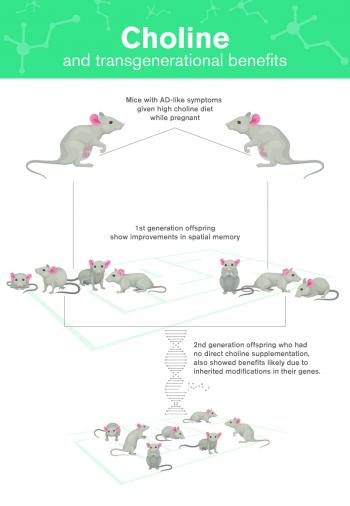
Essential nutrient may help fight Alzheimer's across generations
January 8, 2019
Researchers are exploring a safe and simple treatment for one of the most devastating
and perplexing afflictions: Alzheimer's disease (AD). They are investigatign the effects of choline, an
important nutrient that may hold promise in the war against the memory-stealing disorder. The study
focuses on mice bred to display Alzheimer’s-like symptoms. Results demonstrate that when these mice are
given high choline in their diet, their offspring show improvements in spatial memory, compared with those
receiving a normal choline regimen in the womb.
Click to read the full
article on Science Daily
Click
to read the full article on ASU News
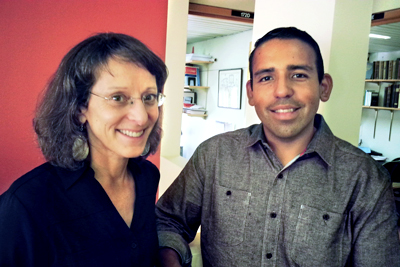
More choline for mom decreases Down syndrome effects
September 11, 2013
Down syndrome fetuses dramatically benefit when their mothers increase their intake of
the nutrient choline during pregnancy and nursing, report Cornell researchers in the journal Neurobiology
of Disease. Increased choline by moms bolsters brain functions and plays a profound health role for Down
syndrome offspring throughout their lives. Increased maternal choline intake improves spatial cognition
and attention, and delays aging-related memory decline in normal laboratory rats. The present findings
with Down syndrome mice indicate that increased maternal choline consumption may also lessen the
impairment of individuals with Down syndrome and reduce the risk of Alzheimer’s disease, which is seen in
nearly all Down syndrome individuals.
Click
to read the full article